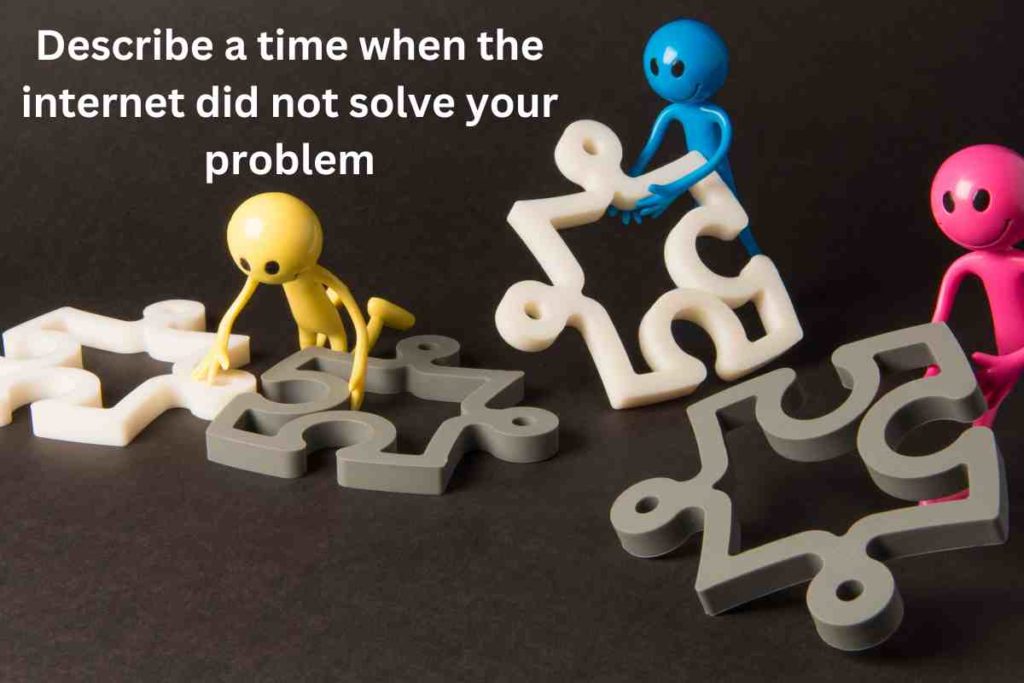Describe a time when the internet did not solve your problem.
- When was it?
- Where was it?
- Why it could not solve your problem?
- What did you do?
Sample Answer 1:Describe a time when the internet did not solve your problem.
I recall a time last year when I was working on my thesis. I needed primary data on a niche topic concerning indigenous agricultural practices in a remote region of my country. I scoured the internet for specific information, thinking that there would be some research or articles online.
However, to my dismay, online resources were surprisingly scarce on this topic. The internet, which was usually a goldmine of information, fell short this time.
Realizing the limitations of digital resources, I approached the university library. I discovered books and journals that provided in-depth analysis, proving instrumental for my thesis.
Sample Answer 2:Describe a time when the internet did not solve your problem.
Last month, I decided to restore an old family clock. I thought a quick YouTube tutorial would guide me through the intricate process of repairing antique items. However, the inner workings of this specific clock seemed to be quite rare, and I couldn’t find any matching online guide.
Instead of risking damage by experimenting based on partial knowledge, I reached out to a local artisan skilled in antique restorations. His hands-on expertise was invaluable and something the internet couldn’t provide.
Also, Read A Happy Memory from Your Childhood Cue Card
Sample Answer 3:Describe a time when the internet did not solve your problem.
Two years ago, while travelling through a quaint village, I experienced severe car trouble. Given the remote location, the internet connectivity was poor. My attempts to search for a solution or a nearby mechanic online were futile.
Instead, I relied on the locals. They guided me to a nearby mechanic who, using traditional methods, fixed my car. This experience was a testament to the importance of human interaction and local knowledge over digital solutions.
Sample Answer 4:Describe a time when the internet did not solve your problem.
I remember trying to bake a family recipe that was passed down through generations. I wasn’t sure about a particular ingredient’s modern-day equivalent. Online searches provided various confusing alternatives.
Rather than guessing and potentially ruining the dish, I called my grandmother. She clarified the ingredient and even shared more tips to perfect the recipe. This instance reminded me that while the internet offers vast knowledge, it doesn’t hold all the answers, especially the ones steeped in tradition.
Sample Answer 5:Describe a time when the internet did not solve your problem.
In 2020, amid the pandemic, I attempted to learn the violin via online classes. However, my progress was slow, and the nuances were challenging to grasp through virtual lessons alone.
Recognizing the limitations, I later enrolled in face-to-face classes with a local instructor. The hands-on guidance, instant feedback, and tactile experience proved that certain skills are better learned in person than through the Internet.
Sample Answer 6:Describe a time when the internet did not solve your problem.
Last winter, I faced an emotional challenge. I searched for online articles, hoping for solutions or coping techniques. But the generic advice didn’t resonate with my unique situation.
I decided to consult a counsellor in person. The tailored advice, empathy, and human connection provided the clarity and support I needed, emphasizing that emotional complexities often require a personal touch beyond digital answers.
Follow-up Questions and Answers:Describe a time when the internet did not solve your problem
- Do you think people over-rely on the internet these days?
- Yes, many do. The internet’s convenience makes it a go-to, but it’s essential to recognize its limitations.
- Are there specific areas where traditional methods are better than online solutions?
- Absolutely. Areas like hands-on skills, emotional support, and specific traditional knowledge often benefit from a personal touch.
- How has the internet changed the way we approach problems?
- It has made us more self-reliant and resourceful, often seeking instant solutions online before exploring traditional methods.
- Can the internet replace human interactions entirely?
- While the internet can provide information and virtual communication, it can’t replicate the depth, nuance, and warmth of face-to-face interactions.
- Do you think there’s a risk of losing traditional knowledge because of over-dependence on the internet?
- Yes, there’s a risk. If we don’t document and pass down traditional knowledge, it might get overshadowed by easily accessible online information.
- How do you usually solve problems that the internet can’t?
- I consult experts, read books, or seek advice from elders or experienced individuals.
- Has the internet made us less patient in seeking solutions?
- It’s possible. The ease and speed of finding answers online might reduce our tolerance for prolonged research or consultation.
- What are the dangers of relying solely on the internet for information?
- Misinformation, loss of critical thinking, and reduced human interaction are potential risks.
- Do you believe that the next generation will be more internet-dependent?
- It seems likely, given the trajectory, but hopefully, they’ll also value and seek traditional knowledge sources.
- How do you validate the information you find online?
- Cross-referencing with reputable sources, checking the credibility of websites, and sometimes seeking expert opinions ensure the accuracy of online information.

